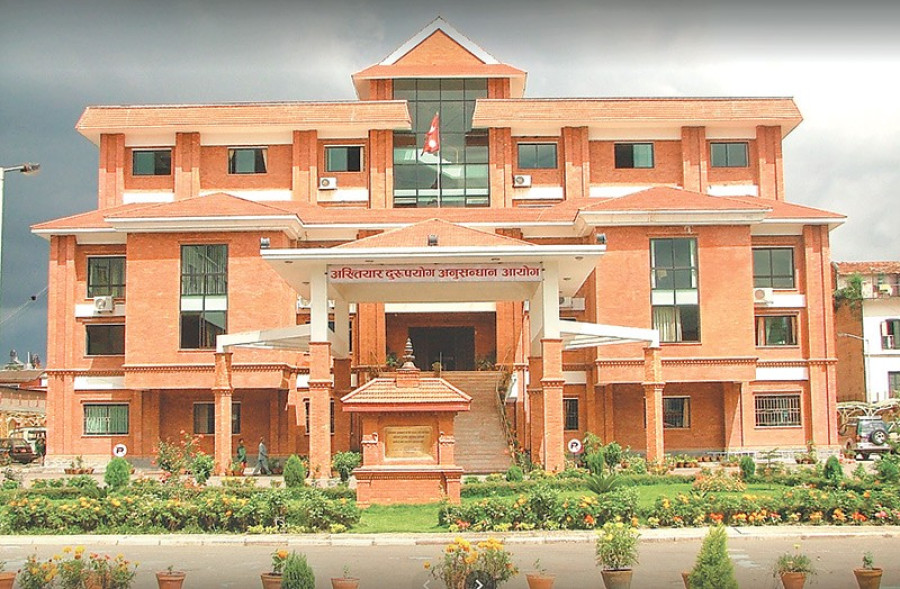Valley
Corruption rampant in local governments: Anti-graft body
Local governments—municipalities and rural municipalities—are one of the most corrupt agencies in the country, according to a survey by the Commission for Investigation of Abuse of Authority
Prithvi Man Shrestha
Local governments—municipalities and rural municipalities—are one of the most corrupt agencies in the country, according to a survey by the Commission for Investigation of Abuse of Authority which says people are being made to pay “additional charges” to receive services from the local units.
The anti-graft agency survey report titled “Study on Corruption and Good-Governance in Nepal-2075”, released on Monday, shows municipalities and rural municipalities are the second most corrupt entities after land revenue offices.
Rameshwor Dangal, spokesperson for the CIAA, told the Post that the anti-graft body has been receiving complaints in increasing numbers about irregularities at the hands of elected representatives.
As many as 2,566 complaints related to the Ministry of Federal Affairs and General Administration were registered with the CIAA in last fiscal year, according to the commission’s Annual Report 2017-18.
The highest number of respondents (55 percent) termed land revenue offices the most corrupt, while 41.6 percent said they had to pay extra money while visiting municipalities and rural municipalities. While 54.1 percent of respondents said they have to pay highest amount of bribe at land revenue offices, 33.9 percent said they have to pay highest amount of “additional charges” at rural municipalities and municipalities.
The anti-graft agency report paints a bleak picture of governance at the local level even after the country adopted federalism to ensure that people get services at their doorsteps with convenience.
According to the CIAA, the survey was conducted in the second half of the fiscal year 2017-18 when elected representatives had already assumed office.
"Even after the elected representatives assumed office, complaints about irregularities at local level have not come down,” said Dangal. "We are also receiving complaints that the ward chairmen have been buying their own dozers and working on projects of local governments, in a clear case of conflict of interest. We are also receiving complaints against the elected representatives, especially those who have the background of contractors. They are using their power and authority to bag contracts for their own firms.”
Read: Nepal falls two places to 124 on Corruption Perception Index
The number of complaints about irregularities at the local level registered with the CIAA in the last fiscal year also suggests poor governance. According to the CIAA, it received the highest number of complaints about irregularities at the offices related to Ministry of Federal Affairs and General Administration which oversees the affairs of the local governments in the last fiscal year.
After the local elections were held after a gap of 20 years in 2017, it was largely expected that elected representative would be accountable to the people and governance would improve.
But, the survey has exposed continued poor governance at the local level.
The survey was conducted among 3,400 service seekers at 16 government offices including the local governments—municipalities, rural municipalities and district coordination committees in 17 districts—where 41.6 percent of respondents said they had to pay bribe to receive services from local governments.
A Transparency International report published on Tuesday also said corruption at public institutions, graft in businesses, misuse of public position, weak monitoring and actions, poor access to information and political corruption continued in Nepal even after the elections. Nepal has fallen two places to 124 on the Corruption Perception Index. “The score (31 out of 100) received by Nepal on the index suggests that the situation of corruption is worrisome,” said the report.
Officials at the Ministry of Federal Affairs and General Administration say elected representatives at the local levels have been so empowered that there is a tendency to breach laws and rules, as there is no oversight mechanism. The CIAA initiates actions only after complaints are registered with it.
A senior official at the ministry pointed out a number anomalies at local level taking place at the behest of elected representatives.
"The local executives have been spending money in projects which were not endorsed by the local assembly. Conditional grants provided by the Centre have also been misused at many local governments although that cannot be used in other purposes except the ones fixed by the Centre. Local governments are also allocating budget in areas where Local Level Operation Act does not allow them to do so," the official told the Post requesting anonymity. "There is also a growing tendency among a number of local governments to make low-cost estimate of projects so that contract could be awarded at a lower amount in return for kickback from contractors."
Dangal also said that the anti-graft agency has received complaints about local governments spending resources going against the approved budgetary plan and low quality works of the projects overseen by the local governments.
But Municipal Association of Nepal, an umbrella body of all the municipalities in the country, refused to buy the claims made in the CIAA report that irregularities have increased at local governments under the elected representatives.
“People are happy with local governments in most of the areas as they are getting better services. The issue of irregularities has been hugely generalised to show all local governments are bad under elected representatives. It’s wrong to paint all local governments with the same brush,” said Ashok Kumar Byanju Shrestha, president of the association. “I think it is an attempt to weaken the local governments.”




 16.12°C Kathmandu
16.12°C Kathmandu













